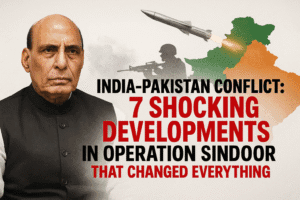India-Pakistan Conflict: 7 Shocking Developments in Operation Sindoor That Changed Everything
Following the Pahalgam terror attack, India launched Operation Sindoor on May 7, conducting precision strikes against terror camps in Pakistan, killing over 100 militants. Defence Minister Rajnath Singh praised the armed forces and called for IAEA oversight of Pakistan’s nuclear arsenal, citing security risks. A fragile ceasefire was agreed on May 10, though India insists future talks will focus solely on terrorism. Reports reveal the IAF crippled 11 Pakistani airbases, forcing Islamabad to relocate aircraft.
Diplomatic efforts saw India rally global support while suspending the Indus Waters Treaty until Pakistan ends cross-border terror. Political reactions varied, with opposition leaders demanding stronger border security and compensation for affected civilians. The conflict underscores India’s resolve against terrorism while exposing Pakistan’s isolation on the global stage.

India-Pakistan Conflict: 7 Shocking Developments in Operation Sindoor That Changed Everything
Defence Minister Rajnath Singh visited the Srinagar Airbase on May 15, praising Indian forces for their precision strikes in Operation Sindoor, which targeted terror camps in Pakistan following the Pahalgam attack. Singh also raised concerns over Pakistan’s nuclear capabilities, urging the International Atomic Energy Agency (IAEA) to oversee its arsenal, citing Islamabad’s “irresponsible and rogue” behavior.
Ceasefire Holds, But Political Reactions Vary
After four days of intense cross-border strikes, India and Pakistan agreed to a ceasefire on May 10. While Pakistan’s PM Shehbaz Sharif expressed willingness for peace talks, Indian External Affairs Minister S. Jaishankar clarified that any dialogue would focus solely on terrorism, demanding Pakistan hand over wanted militants and dismantle terror infrastructure.
Samajwadi Party chief Akhilesh Yadav criticized the BJP’s celebratory tone, stating, “Victory is celebrated, not ceasefire.” Meanwhile, PDP leader Mehbooba Mufti emphasized rehabilitating border residents affected by shelling, calling for better bunkers and compensation.
Military and Diplomatic Fallout
- IAF’s Decisive Strikes: Reports reveal India hit 11 of Pakistan’s 13 airbases with BrahMos and Scalp missiles, severely damaging UAVs and early-warning aircraft.
- Global Engagements: India’s envoys briefed foreign leaders, while Israel’s Defense Ministry DG praised Operation Sindoor in a call with Defence Secretary Rajesh Kumar.
- Economic Measures: India revoked security clearance for Turkish firm Celebi Aviation and traders proposed a boycott of Turkey and Azerbaijan for backing Pakistan.
Indus Waters Treaty in Limbo
Jaishankar confirmed the treaty remains suspended until Pakistan ends cross-border terrorism, countering Islamabad’s plea for reconsideration.
What’s Next?
With tensions simmering, India’s focus remains on securing borders and ensuring accountability for terrorism. The global community watches closely as both nations navigate this fragile truce.
Why This Matters:
This conflict underscores India’s zero-tolerance policy toward terrorism while highlighting geopolitical complexities. The call for IAEA oversight of Pakistan’s nukes signals a strategic push to globalize the issue of regional stability.
Key Takeaways:
- Military Success: Operation Sindoor demonstrated India’s capability to strike deep into enemy territory.
- Diplomatic Firmness: No talks unless terrorism is addressed.
- Human Cost: Civilian suffering at borders demands long-term solutions.
You must be logged in to post a comment.